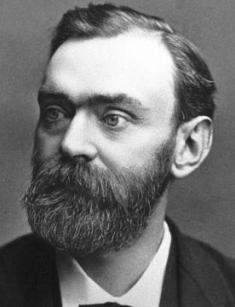Nobel s inventions made him a millionaire
Nobel s inventions made him a millionaire
ALFRED NOBEL – A MAN OF CONTRASTS
Alfred Nobel, the great Swedish inventor and industrialist, was a man of many contrasts. He was the son of a bankrupt, but became a millionaire; a scientist with a love of literature, an industrialist who managed to remain an idealist. He made a fortune but lived a simple life, and although cheerful in company he was often sad in private. A lover of mankind, he never had a wife or family to love him. A patriotic son of his native land, he died alone on foreign soil.
He invented a new explosive, dynamite, to improve the peacetime industries of mining and road building, but saw it used as a weapon of war to kill and injure his fellow men. During his useful life he often felt he was useless: «Alfred Nobel», he once wrote of himself, «ought to have been put to death by a kind doctor as soon as, with a cry, he entered life». World-famous for his works he was never personally well known, for throughout his life he avoided publicity. «I do not see» he once said, «that I have deserved any fаme and I have no taste for it», but since his death, his name has brought fame and glory to others.
He was born in Stockholm on October 21, 1833 but moved to Russia with his parents in 1842, where his father, Immanuel, made a strong position for himself in the engineering industry. Immanuel Nobel invented the landmine and made a lot of money from government orders for it during the Crimean War, but went bankrupt soon after. Most of the family returned to Sweden in 1859, where Alfred rejoined them in 1863, beginning his own study of explosives in his father’s laboratory. He had never been to school or university but had studied privately and by the time he was twenty was a skilful chemist and excellent linguist, speaking Swedish, Russian, German, French and English.
Like his father, Alfred Nobel was imaginative and inventive but he had better luck in business and showed more financial sense. He was quick to see industrial openings for his scientific inventions and built up over 80 companies in 20 different countries. Indeed his greatness lays in his outstanding ability to combine the qualities of an original scientist with those of a forward-looking industrialist. But Nobel’s main concern was never with making money or even with making scientific discoveries.
Seldom happy he was always searching for a meaning of life and from his youth had taken a serious interest in literature and philosophy. Perhaps because he could not find ordinary human love — he never married — he came to care deeply about the whole of mankind. He was always generous to the poor: «I’d rather take care ofthe stomachs of the living than the glory of the dead in the form of stone memorials», he once said. His greatest wish, however, was to see an end to wars and thus peace between nations, and he spent much time and money working for this cause until his death, in Italy in 1896. His famous will inwhich he left money to provide prizes for outstanding works in Physics, Chemistry, Physiology, Medicine, Literature and Peace is a memorial to his interests and ideals. And so, the man who felt he should have died at birth is remembered and respected long after his death.
Vocabulary
Ex.1. Ответьте на вопросы:
1. Was Alfred Nobel the son of a millionaire?
2. How did he make a fortune?
3. What did Alfred invent?
4. Did he have a family?
5. Was Alfred personally well known?
6. When and where was he born?
7. Why did Alfred move to Russia?
8. Did Immanuel Nobel invent the landmine or dynamite?
9. What kind of person was Alfred?
10. What was his greatest wish?
Ex.2. Переведите на русский язык слова и словосочетания:
Great inventor; manage to remain; make a fortune; cheerful in company; native land; foreign soil; mining; fellow men; useless; publicity; deserve; fame; glory; strong position; order; skilful chemist; greatness; ability; concern; generous; stomach; cause; will; respect.
Ex.3. Переведите на английский язык слова и словосочетания:
Жизнерадостный; промышленник; разбогатеть; чужая земля; улучшить; ранить соотечественников; бесполезный; всемирно-известный; избегать гласности; заслужить славу; прочная позиция; превосходный лингвист; изобретательный; главная цель; щедрый для бедных; уважать.
Ex.4. Подберите антонимы:
Bankrupt; foreign soil; manage; make a fortune; millionaire; simple life; sad; native land; useful life; world-famous; strong position; excellent linguist; skilful chemist; luck; generous; cheerful; useless; respect.
Ex.5. Соответствуют ли данные предложения содержанию текста:
1. Alfred Nobel’s father went bankrupt before the birth of Alfred.
2. Alfred’s father was a successful inventor.
3. Alfred studied chemistry.
4. Alfred knew science but was a poor linguist.
5. Immanuel Nobel was quick to see industrial openings for his scientific inventions and built up over eighty companies in different countries.
6. Throughout his life Alfred Nobel avoided publicity.
7. Nobel’s inventions made him a millionaire.
8. He was interested in literature and philosophy.
9. Alfred Nobel died in Paris in 1896.
10. After Alfred Nobel’s death his name brought him fame and glory.
Иностранный язык (английский яз)
Задания к тексту
1. Was Alfred Nobel the son of a millionaire?
2. How did he make a fortune?
3. What did Alfred invent?
4. Did he have a family?
5. Was Alfred personally well known?
6. When and where was he born?
8. Did Immanuel Nobel invent the landmine or dynamite?
9. What kind of person was Alfred?
10. What was his greatest wish?
Ex.2. Переведите на русский язык слова и словосочетания:
Great inventor; manage to remain; make a fortune; cheerful in company; native land; foreign soil; mining; fellow men; useless; publicity; deserve; fame; glory; strong position; order; skilful chemist; greatness; ability; concern; generous; stomach; cause; will; respect.
Ex.3. Переведите на английский язык слова и словосочетания:
Жизнерадостный; промышленник; разбогатеть; чужая земля; улучшить; ранить соотечественников; бесполезный; всемирно-известный; избегать гласности; заслужить славу; прочная позиция; превосходный лингвист; изобретательный; главная цель; щедрый для бедных; уважать.
Bankrupt; foreign soil; manage; make a fortune; millionaire; simple life; sad; native land; useful life; world-famous; strong position; excellent linguist; skilful chemist; luck; generous; cheerful; useless; respect.
Ex.5. Соответствуют ли данные предложения содержанию текста:
1. Alfred Nobel’s father went bankrupt before the birth of Alfred.
2. Alfred’s father was a successful inventor.
3. Alfred studied chemistry.
4. Alfred knew science but was a poor linguist.
5. Immanuel Nobel was quick to see industrial openings for his scientific inventions and built up over eighty companies in different countries.
6. Throughout his life Alfred Nobel avoided publicity.
7. Nobel’s inventions made him a millionaire.
8. He was interested in literature and philosophy.
9. Alfred Nobel died in Paris in 1896.
10. After Alfred Nobel’s death his name brought him fame and glory.
Ex.6. Выделите пять основных идей текста.
Иностранный язык (Английский язык в техническом вузе)
Exercises to the text «Alfred Nobel»
1. Was Alfred Nobel the son of a millionaire?
2. How did he make a fortune?
3. What did Alfred invent?
4. Did he have a family?
5. Was Alfred personally well known?
6. When and where was he born?
8. Did Immanuel Nobel invent the landmine or dynamite?
9. What kind of person was Alfred?
10. What was his greatest wish?
Ex.2. Переведите на русский язык слова и словосочетания:
Great inventor; manage to remain; make a fortune; cheerful in company; native land; foreign soil; mining; fellow men; useless; publicity; deserve; fame; glory; strong position; order; skilful chemist; greatness; ability; concern; generous; stomach; cause; will; respect.
Ex.3. Переведите на английский язык слова и словосочетания:
Жизнерадостный; промышленник; разбогатеть; чужая земля; улучшить; ранить соотечественников; бесполезный; всемирно-известный; избегать гласности; заслужить славу; прочная позиция; превосходный лингвист; изобретательный; главная цель; щедрый для бедных; уважать.
Bankrupt; foreign soil; manage; make a fortune; millionaire; simple life; sad; native land; useful life; world-famous; strong position; excellent linguist; skilful chemist; luck; generous; cheerful; useless; respect.
Ex.5. Соответствуют ли данные предложения содержанию текста:
1. Alfred Nobel’s father went bankrupt before the birth of Alfred.
2. Alfred’s father was a successful inventor.
3. Alfred studied chemistry.
4. Alfred knew science but was a poor linguist.
5. Immanuel Nobel was quick to see industrial openings for his scientific inventions and built up over eighty companies in different countries.
6. Throughout his life Alfred Nobel avoided publicity.
7. Nobel’s inventions made him a millionaire.
8. He was interested in literature and philosophy.
9. Alfred Nobel died in Paris in 1896.
10. After Alfred Nobel’s death his name brought him fame and glory.
Английский в энергетике
Alfred Nobel
ALFRED NOBEL – A MAN OF CONTRASTS
He was born in Stockholm on October 21, 1833 but moved to Russia with his parents in 1842, where his father, Immanuel, made a strong position for himself in the engineering industry. Immanuel Nobel invented the landmine and made a lot of money from government orders for it during the Crimean War, but went bankrupt soon after. Most of the family returned to Sweden in 1859, where Alfred rejoined them in 1863, beginning his own study of explosives in his father’s laboratory. He had never been to school or university but had studied privately and by the time he was twenty was a skilful chemist and excellent linguist, speaking Swedish, Russian, German, French and English.
Like his father, Alfred Nobel was imaginative and inventive but he had better luck in business and showed more financial sense. He was quick to see industrial openings for his scientific inventions and built up over 80 companies in 20 different countries. Indeed his greatness lays in his outstanding ability to combine the qualities of an original scientist with those of a forward-looking industrialist. But Nobel’s main concern was never with making money or even with making scientific discoveries.
Seldom happy he was always searching for a meaning of life and from his youth had taken a serious interest in literature and philosophy. Perhaps because he could not find ordinary human love — he never married — he came to care deeply about the whole of mankind. He was always generous to the poor: «I’d rather take care of the stomachs of the living than the glory of the dead in the form of stone memorials», he once said. His greatest wish, however, was to see an end to wars and thus peace between nations, and he spent much time and money working for this cause until his death, in Italy in 1896. His famous will in which he left money to provide prizes for outstanding works in Physics, Chemistry, Physiology, Medicine, Literature and Peace is a memorial to his interests and ideals. And so, the man who felt he should have died at birth is remembered and respected long after his death.
Alfred Nobel
Alfred Nobel: biography
Alfred Bernhard Nobel is a Sweden chemist and engineer known as the creator of dynamite, gelignite, and cordite.
The would-be scientist was born on October 21, 1833. The boy’s father was Immanuel Nobel, an inventor and industrialist. He became famous thanks to his exploding mines used by the Russians during the Crimean War; this invention brought him an emperor’s award.
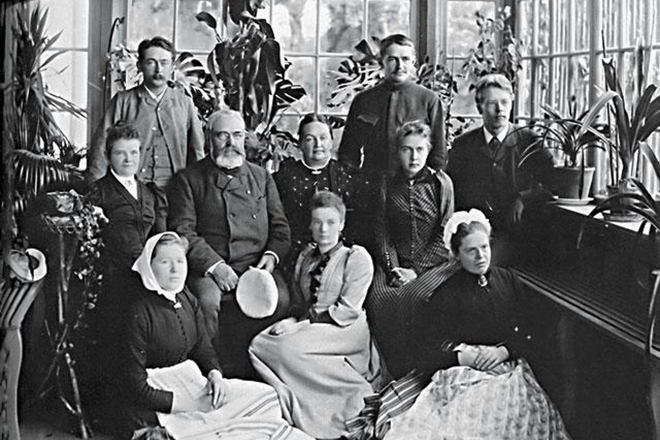
The mother, Karolina Andriette, was a housekeeper and brought up four sons: Alfred, Robert, Ludvig, and Emil. The family lived in Sweden and moved to Finland; the migration to St. Petersburg, Russia, followed. Immanuel’s activities were not limited to the military sphere – he also contributed to the house heating system with water vapor and invented the rotary lathe for wagon wheels.
Nobel’s children were home-schooled; their private tutors taught them sciences, literature, and European languages, so the boys spoke Sweden, Russian, French, English, and German. At the age of 17, young Alfred traveled across Europe and the United States; he had an opportunity to co-work with Théophile-Jules Pelouze. In 1936, he identified glycerin chemical composition); in 1840-1843, Pelouze and Ascanio Sobrero were working on nitroglycerine production.
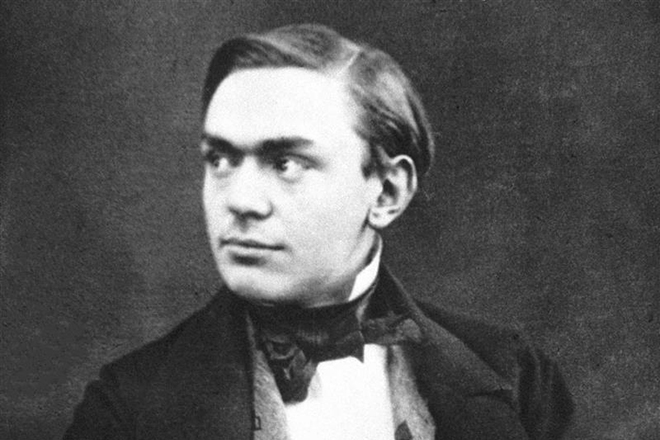
Under the guidance of the Russian scientist Nikolay Nikolaevich Zinin, Alfred took an interest in glyceryl trinitrate. It brought the young man to the invention that made him famous: dynamite was created on May 7, 1867.
Science and inventions
Nobel left France to the USA to collaborate with the American researcher of the Swedish origin John Ericsson, who created the civil-war participant USS Monitor and studied solar energy properties. The young student conducted many chemical and physical experiments under his mentor’s guidance.
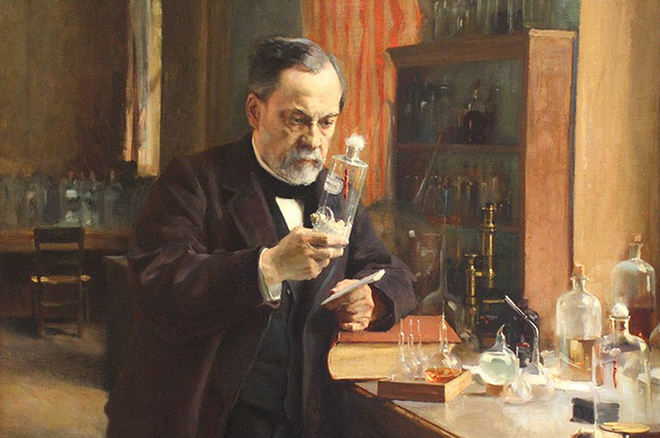
As long as Novel returned to Stockholm, he did not stop working; he was looking for an active substance that could reduce the explosive hazard level of glyceryl trinitrate. One of the experiments ended up with a tragedy: there was an explosion at one of the Nobel’s plants on September 3, 1864; several people, including Alfred’s brother Emil, died. The young man had just turned 20. The father could not stand it and had a heart attack; he passed away soon.
The next month after the incident, Alfred received a patent on nitroglycerine; he continued with the licenses on dynamite, gelatine dynamite detonator, and other explosives. The scientist was equally successful in practical facilities: fridge, steam generator, gas burner, barometer, and hydrometer. It was Nobel who developed the chemical composition of artificial silk and cellulose nitrate. Overall, he could boast 355 inventions in biology, chemistry, optics, medicine, and metallurgy.
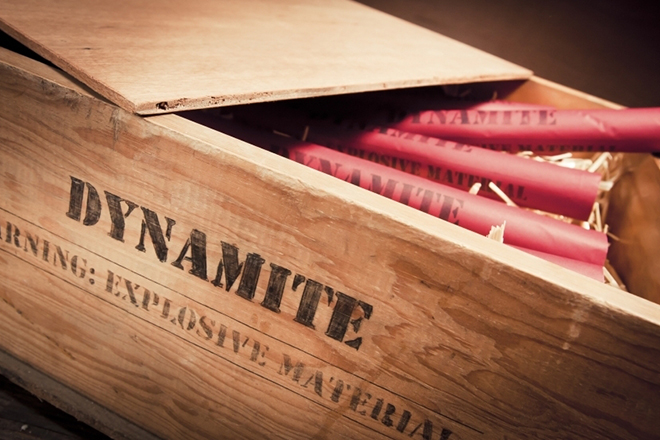
To popularize each invention, the scientist organized presentations and showed how a new instrument or substance worked. Such events were immensely popular among the amateurish public, as well as Nobel’s colleagues and friends.
More than that, the man was fond of writing; poetry and prose were his day-off hobby. The play Nemesis became one of the most controversial texts; it was forbidden for many years by the church until The Royal Dramatic Theatre staged it in Stockholm in 2003.
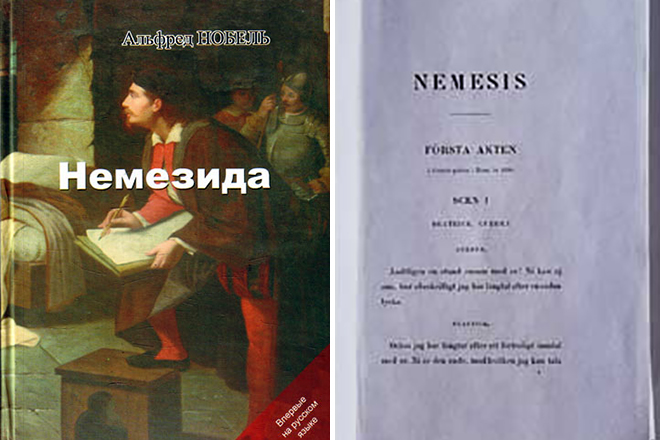
Alfred was a person of multiple interests: science, philosophy, history, literature. He made friends with popular painters, writers, scientists, and state figures; dinners and royal parties were frequent in his life. The inventor was an honorary member of many Academies in Europe: Sweden, England, Paris, Uppsala University; the list of his awards includes French, Swedish, Brazil, and Venezuelan orders.
Experiments required many expenditures, and the family had some financial problems until the brothers purchased a stock of shares of Baku oil field; they found themselves rich soon.
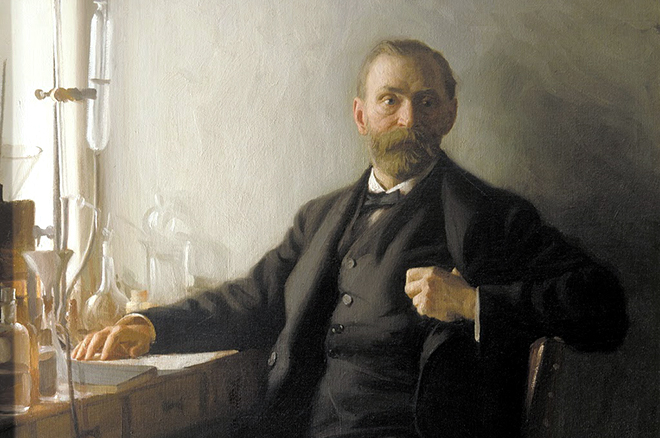
In 1889, the Universal Peace Congress was held in Paris; Nobel delivered lectures there. Some participants were sarcastic about that: the person who invented the weapon could not be present there. The media called Alfred the king of murders and bloody millionaire; the scientist was upset about that, and such an attitude almost broke him.
Personal life
Alfred Nobel never married. The future scientist fell in love with a drug-store girl for the first time; she died of TB soon after they met. However, the engineer did not mourn for a long time – he was infatuated by the drama actress Sarah Bernhardt. Nobel asked for his mother’s blessing, but sagacious Andriette did not approve of his choice. The young man broke up with the artist and stopped looking for a partner; he threw himself in work.
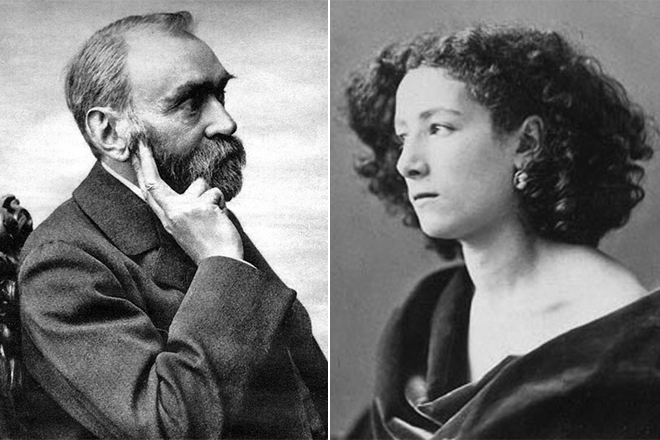
In 1874, Alfred was looking for a secretary and met Countess Bertha Kinsky; they became lovers for several years. However, the woman left the engineer and went to the capital of Austria, where another fiancé was waiting for her.
In his last years, an illiterate peasant was following Nobel; she wanted to become his wife by all means, but the chemist kept rejecting her.
The Nobel Prize
In 1893, Alfred Nobel created his first document, according to which a large part of his money would go to the Royal Swedish Academy of Sciences after his death. A fund would be opened to give annual awards for scientific discoveries. The Stockholm University, the city hospital, and the Karolinska Institute would receive 5% of his heritage each.
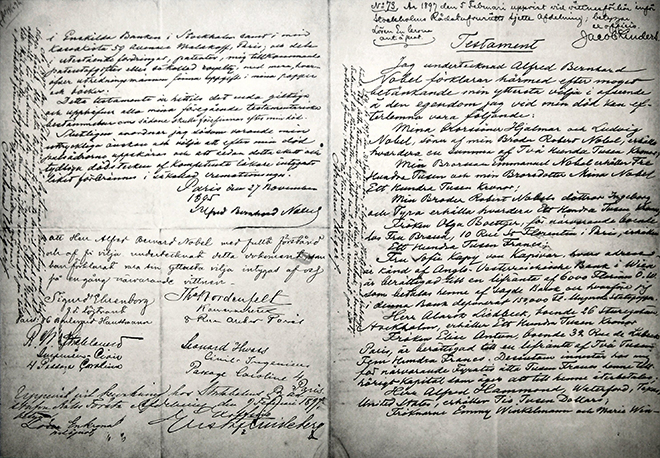
Two years later, some changes were introduced: the payments to relatives and organizations were cancelled while the fund with stocks and obligations was to be made. The profit would be subdivided into five parts; today, prizes are given for the discoveries in physics, chemistry, physiology and medicine, literature achievements, and peace activities.
Death
The engineer died of a stroke on December 10, 1896, in his own villa in Sanremo. His body was brought to his homeland and buried in Norra begravningsplatsen, Sweden.
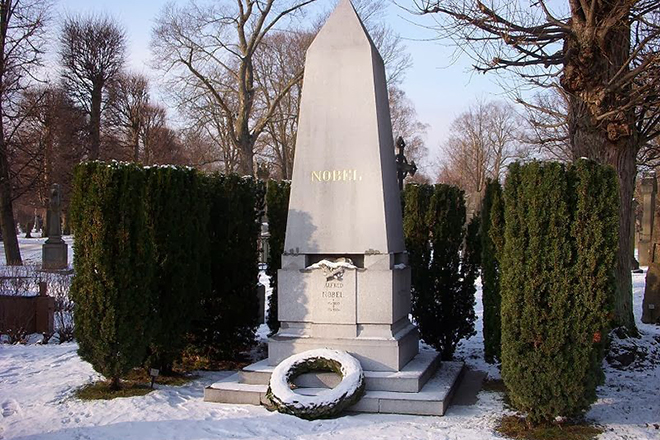
Three years passed before Alfred Nobel’s last will was revealed and executed. In 1901, when the country’s parliament finished all the formalities, the first outstanding scientists received their awards.
